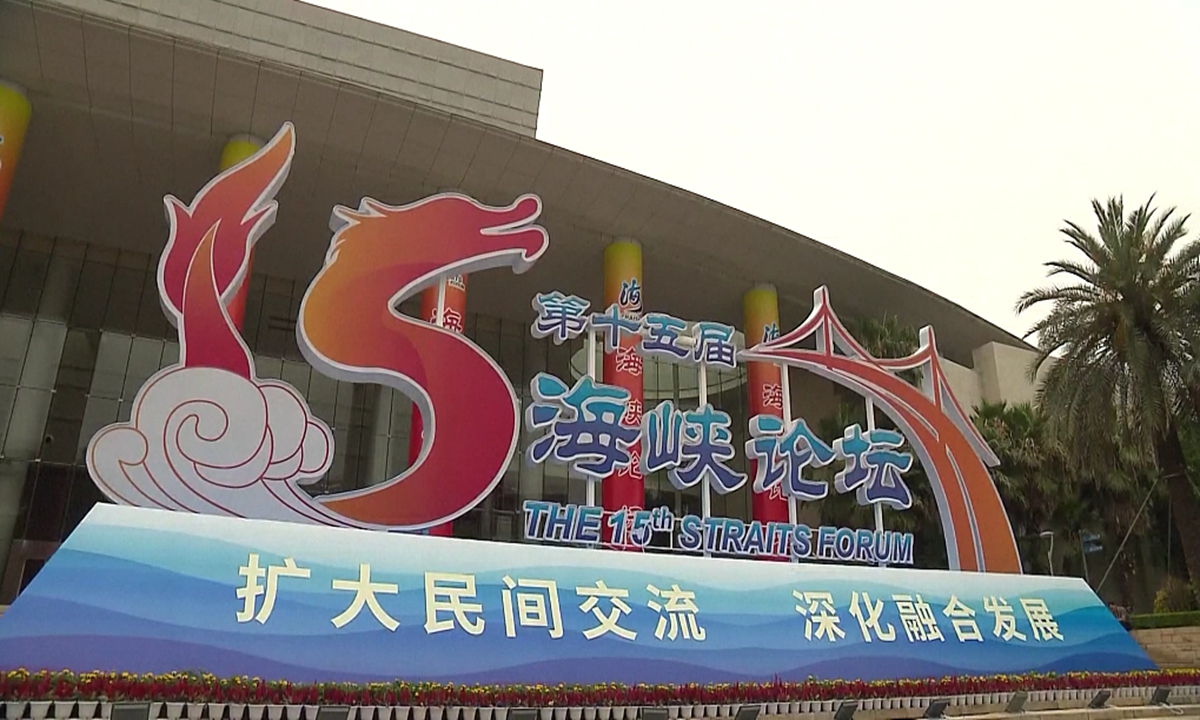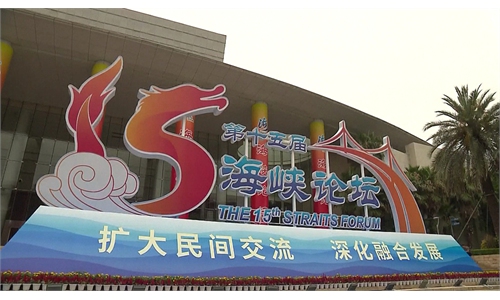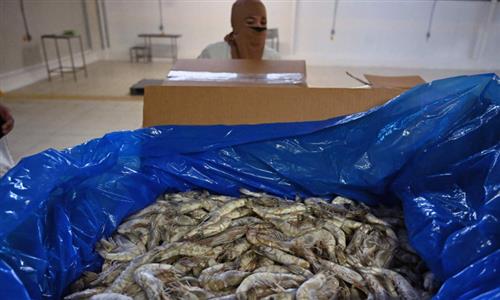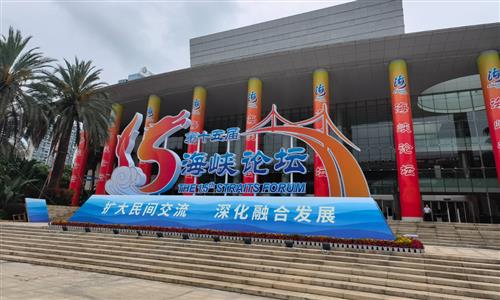Taiwan youth attracted by market, potential, culture of Chinese mainland; confident in ‘recovery of cross-Straits exchanges despite DPP’s obstruction’

The 21st Straits Youth Forum starts on June 16, 2023 in Xiamen, East China's Fujian Province. Photo: website of Straits Youth Forum
The 15th Straits Forum, the biggest in-person people-to-people exchange event across the Taiwan Straits since the COVID-19 pandemic, has attracted more than 5,000 attendees from the island, including young people who are now working, studying and living in the mainland, as well as those who are looking forward to opportunities in the mainland despite the cross-Straits tensions caused by the secessionist Democratic Progressive Party (DPP) and collusion between the Taiwan authorities and Washington.
A sub-forum of cross-Straits youth, a parallel session of the Straits Forum, was held in Xiamen, East China's Fujian Province on Friday, with more than 450 attendees from both sides of the Taiwan Straits, including 303 Taiwan attendees, 183 of whom came directly from the island. They shared their experiences, thoughts and stories about their careers, startups and studies in the mainland, and contributed their suggestions for promoting cross-Straits exchange in the future.
According to the organizer, more than 70 percent of Taiwan attendees are "new faces" at the Straits Forum. On Saturday morning, some of these Taiwan attendees will form different groups and go to mainland provinces including Jiangsu, Shandong, Hubei, Sichuan, and other major cities within Fujian Province for further exchanges with their counterparts in the mainland.
Lee Wei-kuo, chairman of the Taipei-based Chinese Youth Trade Development Association, said at the forum on Friday that before he came here in 2016, he had worked for five years in Taiwan, and saw his career reach "its ceiling." "If you only do business in Taiwan, it will be hard for you to develop in other regions, but if you do business in the mainland, it's very natural for you to travel around different provinces and cities across the country."
"If I stay in Taiwan, I can predict what I will become in the next five or even 10 years, but in the mainland, my future has no limit," Lee said. He also told the media that he wants to serve other young people who have plans to work and launch startups in the mainland, to help them better integrate in the mainland and help them to realize their dreams.
Thanks to the mainland policies in developing the Guangdong-Hong Kong-Macao Greater Bay Area and the Western Development Strategy, his company, Huacan Workshop, now operates in Zhuhai, South China's Guangdong Province and Chengdu, Southwest China's Sichuan Province.

The 15th Straits Forum kicks off in Xiamen, Fujian Province, on June 16, 2023. Photo: VCG
After the pandemic, the mainland and the world will gradually return to normal, and Li said there will be more and more young people from both sides of the Taiwan Straits who want to hold exchanges with each other.
"In the next 10 years, I believe the Greater Bay Area will and must surpass the San Francisco Bay Area and the Tokyo Bay, so my young friends in Taiwan, please come quickly! When you cross the Straits, you will know how big the world is. Mobile internet, 5G network, e-commerce livestreaming, the mainland's aerospace achievements…all of these great changes are happening in front of us. We are no longer bystanders, we will be part of these changes," Lee said at the forum.
Zheng Bo-yu, vice-president of the Taiwan Youth Council Beijing Association for Taiwan Enterprises and an attendee at the forum, told the Global Times on Friday that due to the regional election in the island next year, many young people in Taiwan are still observing the cross-Straits situation and being cautious because they are concerned about the uncertainties that will come about if the political change in the island further worsens the situation.
The DPP authorities in recent years put up a lot of obstructions to disrupt cross-Straits exchanges, including carrying out propaganda warfare to stigmatize the mainland and intimidate anyone who attempted to go there, and even politically persecuted people who wanted to develop ties with the mainland, Zheng said.
"However, most Taiwan young people will not be intimidated, because many of them actually don't really care about politics. When they are making decisions about business and work, they prioritize market potential, and if they are planning to study, they care more about the universities' rankings and academic abilities. The mainland has clear advantages in these fields," Zheng told the Global Times.
On Thursday, at the press conference on the 15th Straits Forum, Wang Ya-fen, a journalist from Taiwan media outlet chinatimes.com, asked a question about how to give Taiwan compatriots better access to convenient and advanced mobile payment systems such as WeChat payment and Alipay in the mainland, as she said this is one of its great advantages, and Taiwan people want to benefit from it as well.
Chen Zhiyong, deputy director of the Organizing Committee Office of Straits Forum and deputy director of the Taiwan, Hong Kong and Macao Office of Fujian Province, said the mainland has noted this demand and will work to provide better services. "Taiwan compatriots coming to the mainland can use their own credit cards to bind with mainland mobile payment systems and can also use their mainland travel permits for Taiwan residents to apply for debit cards in the Xiamen Bank in Fujian Province, so that they can use the debit cards to get access to mobile systems like WeChat and Alipay."
Zheng said he hoped that in the next step, the mainland could build sustainable communication channels with Taiwan people who come to join events held in the mainland, and to follow up on their demands and inquiries, rather than merely invite them to join the events, and the Taiwan people already working in the mainland will also make contributions to maintaining ties.
The US interference in the Taiwan question and encouragement for "Taiwan independencee secessionists are creating increasing uncertainties and obstructions for cross-Straits peaceful exchange and integration, but Taiwan attendees believe that the exchange and integration between the two sides of the Straits represent the will of the people, and is unstoppable.
Zheng said that when the DPP became the ruling party of the island, many young Taiwan people like Li left the island to come to the mainland, because they didn't have the confidence in the DPP's governance and saw no hope of development in the island.
According to Taiwan media, in 2018, before the COVID-19 pandemic, there were more than 2 million Taiwan people with permanent residence in the mainland, while the overall working-age population in Taiwan island stood at about 11 million.
There is a popular saying in Taiwan about next year's election - "vote for DPP, youth go to war", which shows that the public of Taiwan, especially the youth, want peace and development. Zheng said, "No matter who wins next year, even if it's the DPP, I believe more young people, just like what happened in 2016, will leave the island and come to the mainland to seek their future."




